Neurogenic Arthropathy - degeneration of a joint

Neurogenic Arthropathy - Degeneration of a JOINT, commonly the knee, as a consequence of NEUROPATHY (impaired NERVE function) that causes loss of sensation. Injuries occur to the affected joint because there is limited perception of PAIN or sense of the joint’s position relative to the body and its immediate environment (PROPRIOCEPTION). Neurogenic arthropathy sometimes called Charcot’s joints, often includes unrecognized fractures that do not heal properly because the joint is in continuous motion. As a result the joint becomes deformed and dysfunctional, changes that cause only mild discomfort because of the underlying NEUROPATHY.
Neurogenic Arthropathy - Diagnosis and Treatment
The diagnostic path begins with recognition of the underlying neuropathy. X-RAY can usually confirm the damage to the joint. Treatment for neurogenic arthropathy aims to preserve joint structure and function to the extent possible and may include BONE graft or surgery to stabilize the joint. Some people are good candidates for JOINT REPLACEMENT, though in progressive forms of neurogenic arthropathy the joint may continue to deteriorate around the prosthesis.
| Conditions Associated with Neurogenic Arthropathy | |
|---|---|
| AMYLOIDOSIS | CHARCOT-MARIE-TOOTH (CMT) DISEASE |
| DIABETES | Hansen’s disease (leprosy) |
| SPINA BIFIDA | SPINAL CORD INJURY |
See also CHARCOT-MARIE-TOOTH (CMT) DISEASE; FRACTURE; INFECTIOUS ARTHRITIS; OSTEOARTHRITIS; RHEUMATOID ARTHRITIS.